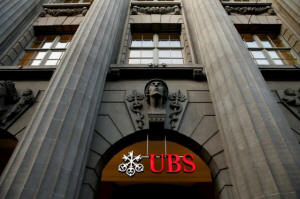|
UBS beefs up funds for
U.S. mortgage mis-selling case to $1.4 billion
 Send a link to a friend
Send a link to a friend
 [October 29, 2016]
By Joshua Franklin and Angelika Gruber [October 29, 2016]
By Joshua Franklin and Angelika Gruber
ZURICH (Reuters) - UBS revealed it had set
aside an extra $417 million to cover potential penalties tied to
mis-selling mortgage-backed securities ahead of the financial crisis as
it delivered an 11 percent rise in third-quarter profit.
Results from UBS on Friday showed the Swiss bank had upped provisions to
cover a range of ongoing residential mortgage-backed securities (RMBS)
legal to $1.405 billion, from $988 million previously.
This follows news last month that the U.S. Department of Justice had
demanded a $14 billion fine from Deutsche Bank in an RMBS investigation.
The DOJ demand was far more than analysts had expected and prompted
fears UBS, the world's biggest wealth manager, could also face a stiffer
penalty. But Chief Executive Sergio Ermotti said on a call following
that each case was different.
"Every bank has its own legal position," he said, declining to make any
comment on the timing of any resolution.
UBS also told investors Hong Kong's regulator was investigating its role
as sponsor of some initial public offerings. If found guilty, it could
face financial penalties and a temporary ban from providing corporate
finance advisory services in Hong Kong.

Pre-tax profit for the three months to end-September rose to 877 million
Swiss francs ($883 million), beating expectations thanks to strong
business in the Swiss market and cost cuts.
"Overall, it was certainly positive," Kepler Cheuvreux analyst Peter
Casanova, who has a "hold" rating on the stock with a target price of
14.60 francs, said. "Basically it shows progress on the cost side."
UBS shares gained 2 percent to 14.21 francs by 0814 ET, outpacing the
European banking sector index.
CLIENT CAUTION
Nevertheless, UBS maintained its gloomy outlook amid negative interest
rates in Switzerland and economic uncertainty which has kept many
investors on the sidelines.
"Our clients really are just not making any moves," Chief Financial
Officer Kirt Gardner said.
UBS did not benefit from the same surge in investment banking revenues
experienced by U.S. banks since its business is more geared towards
equities in Europe and Asia, and Wall Street earnings were boosted by
U.S. bond trading.
It is the downside to UBS's widely lauded post-financial crisis strategy
to focus on capital-light wealth management while scaling back in
investment banking and fixed income, where earnings are more volatile
and which consume more capital.
In the tough environment, UBS's wealth management division saw a sixth
straight quarter of falling or stagnating gross margins. However, the
unit's net margin - which factors in cost savings - rose slightly to 27
basis points.
Transaction-based income in wealth management fell to 334 million
francs, the lowest since 2008.
"I don't expect, until we see a change in the environment, that we're
going to see a material increase at all in our transaction revenue,"
Gardner said.
[to top of second column] |

The logo of Swiss bank UBS is seen at the company's headquarters in
Zurich, Switzerland February 10, 2015. REUTERS/Arnd Wiegmann/File
Photo

Net new money inflows - a volatile but important indicator of future earnings in
private banking - totaled 9.4 billion francs at its wealth management unit and
$800 million at its wealth management business in the Americas.
COST PRESSURE
UBS netted 100 million francs in third-quarter savings, bringing total net cost
cuts since 2013 to 1.5 billion francs.
However, the bank said increased expenditure from new regulation meant it needed
to find additional savings to achieve targeted net cuts of 2.1 billion francs by
end-2017.
Ermotti told analysts cost pressures would likely spur industry consolidation
and left the door open for acquisitions.
"We are not immune from having to consider (non-organic growth). It would be
irresponsible for us not to look at all options."
Group net profit fell to 827 million francs from 2.1 billion francs in the
year-ago quarter, which benefited from a net tax benefit of 1.3 billion francs.
UBS saw a positive impact from deferred tax assets (DTAs) of 424 million francs,
the bulk of the roughly 500 million the bank had forecast in 2016. DTAs are tax
breaks from losses suffered in the financial crisis.
UBS delivered an annualized adjusted return on tangible equity (RoTE) - a key
measure of profitability - of 10.1 percent, short of the bank's target for more
than 15 percent, although it does not give a time frame for this.
The bank's common equity tier 1 capital ratio, an important measure of balance
sheet strength which UBS uses as a benchmark for its dividend, fell to 14.0
percent from 14.2 percent due to a slight rise in risk-weighted assets.


Ermotti played down prospects of raising the ordinary dividend from 0.60 francs
per share in 2015, saying the priority this year was to protect the baseline.
($1 = 0.9932 Swiss francs)
(Editing by Michael Shields and Alexander Smith)
[© 2016 Thomson Reuters. All rights
reserved.] Copyright 2016 Reuters. All rights reserved. This material may not be published,
broadcast, rewritten or redistributed. |